Hades offers players a unique gaming experience through its procedural generation, which creates diverse environments and challenges. The game excels in character development, featuring dynamic interactions and evolving relationships that deepen the narrative. Replayability is enhanced by randomly generated levels and character encounters, encouraging exploration and experimentation. These elements combine to create an engaging and immersive gameplay loop.
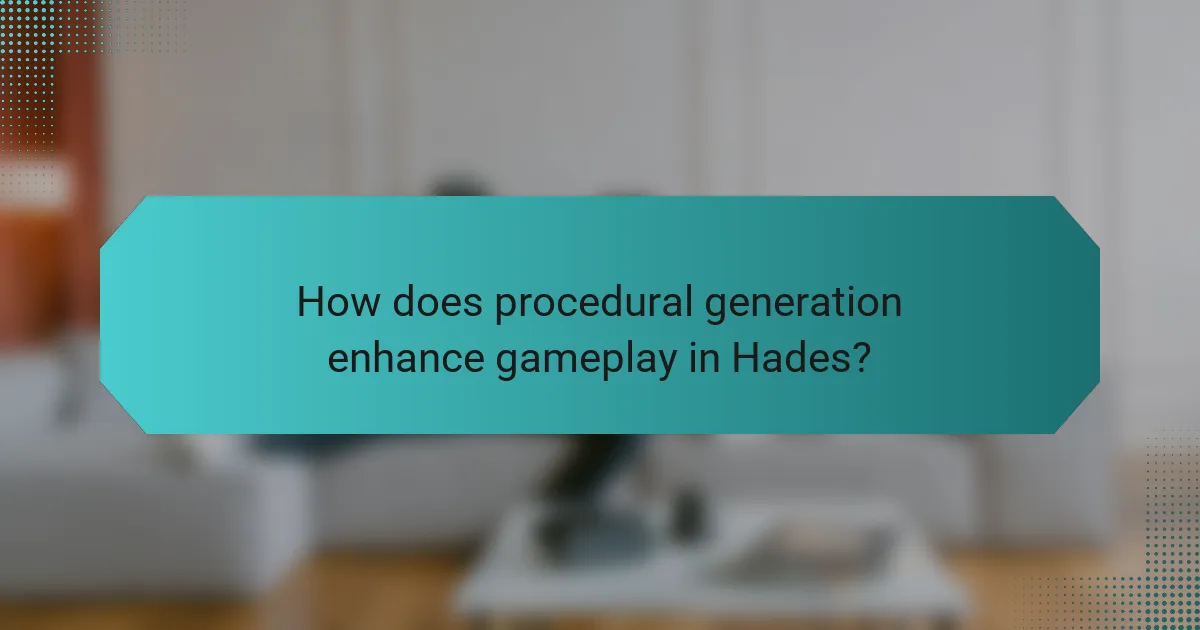
How does procedural generation enhance gameplay in Hades?
Procedural generation in Hades significantly enhances gameplay by creating unique environments and challenges each run. This design promotes exploration and adaptability, ensuring players encounter different layouts, enemies, and rewards. The variability keeps gameplay fresh and engaging, which is essential for replayability. Additionally, the procedural elements contribute to character development, allowing players to experience diverse story arcs and interactions with characters, further enriching the overall experience.
What are the key elements of procedural generation in Hades?
Hades employs key elements of procedural generation to create dynamic environments and enhance replayability. Levels are randomly generated, ensuring unique layouts and encounters each run. This design keeps gameplay fresh and engaging, encouraging players to explore different strategies. Additionally, character interactions and storylines adapt based on player choices, providing a personalized experience that varies with each playthrough. The combination of randomized elements and character development fosters a compelling cycle of discovery and challenge.
How does procedural generation contribute to game variety?
Procedural generation significantly enhances game variety in Hades by creating unique environments and encounters each playthrough. This system ensures that players experience different layouts, enemy placements, and item distributions, promoting exploration and strategy. As a result, the game maintains high replayability, as no two runs feel the same. The dynamic nature of procedural generation allows for continuous engagement, appealing to players seeking fresh challenges. Unique attributes, such as the interplay between character development and procedural elements, further enrich the gameplay experience.
What challenges arise from procedural generation in Hades?
Procedural generation in Hades presents challenges like inconsistent pacing, potential repetitiveness, and difficulty in character development. These issues can affect player engagement and narrative depth. Inconsistent pacing may disrupt the flow, while repetitiveness can lead to diminished excitement over time. Additionally, character development can suffer due to the randomness of encounters, impacting the player’s emotional connection with the story.
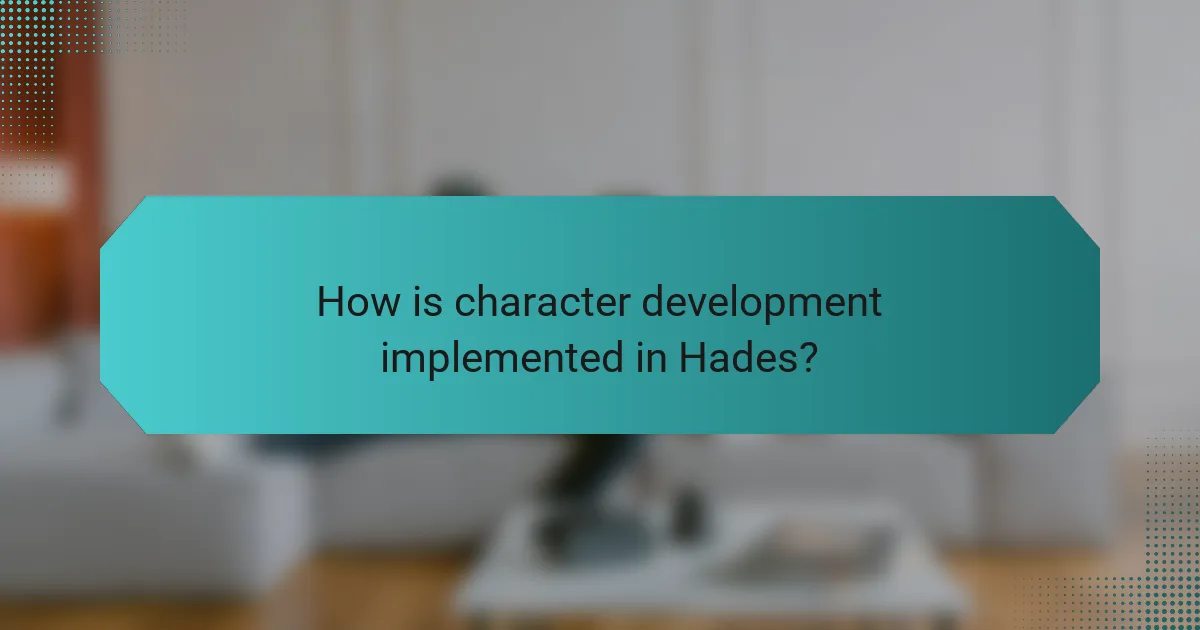
How is character development implemented in Hades?
Character development in Hades is implemented through dynamic interactions and evolving relationships with various characters. Players engage in meaningful dialogues that reveal backstories and motivations. Each character has unique attributes, such as personality traits and quest lines, which deepen the narrative experience. The game’s procedural generation allows for different encounters and character interactions in each run, enhancing replayability. As players progress, they unlock new abilities and upgrades that reflect character growth and influence the overall gameplay experience.
What are the main character attributes in Hades?
The main character attributes in Hades include resilience, adaptability, and depth of personality. Each character features unique backstories and motivations, enhancing player engagement. For instance, Zagreus exhibits determination in his quest, while other characters showcase distinct emotional arcs. The procedural generation of encounters allows for varied interactions, further enriching character development.
How do player choices influence character development?
Player choices significantly shape character development in Hades by influencing relationships, abilities, and narrative arcs. Choices determine which boons and upgrades players receive, directly affecting gameplay style and character growth. For example, selecting different gods for boons can lead to unique abilities and interactions, enriching the player’s experience. This dynamic fosters replayability, as players can explore diverse character paths and outcomes based on their decisions. Each choice adds layers to character narratives, making each playthrough distinct and engaging.
What role do relationships play in character growth?
Relationships in Hades significantly enhance character growth through interactions and emotional depth. Engaging with various characters reveals unique backstories and motivations, shaping the player’s understanding of their journey. These connections foster personal development, as players navigate themes of love, loss, and redemption. The diverse character arcs contribute to replayability, encouraging exploration of different relationship dynamics. Thus, relationships serve as a crucial catalyst for character evolution in Hades.
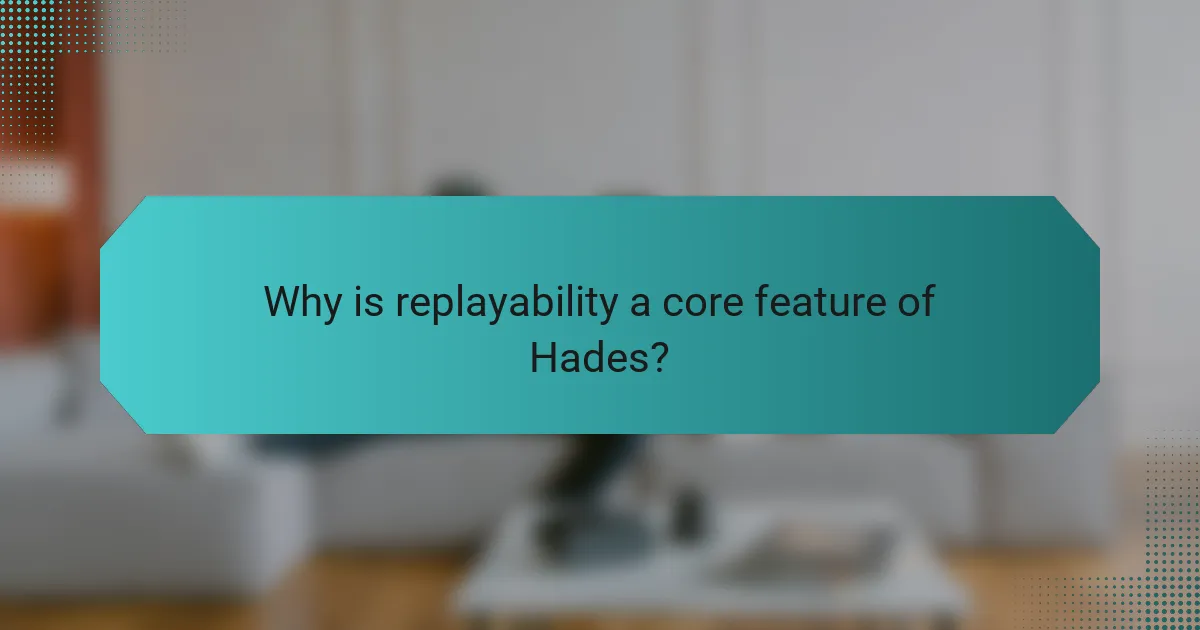
Why is replayability a core feature of Hades?
Replayability is essential in Hades due to its procedural generation and character development. The game features randomly generated levels, ensuring each playthrough feels unique. This variability encourages players to explore different strategies and character builds. Additionally, character interactions evolve with each run, deepening player engagement. The combination of these elements fosters a compelling experience, motivating repeated play.
What mechanisms contribute to replayability in Hades?
Hades features several mechanisms that enhance replayability, including procedural generation, diverse character development, and a rich narrative. Procedural generation ensures unique experiences in each playthrough, as levels and encounters vary significantly. Character development adds depth; players can build relationships and unlock different abilities, creating varied gameplay styles. Additionally, the game’s narrative branches based on player choices, encouraging exploration of multiple storylines. These elements collectively contribute to a compelling replay experience, ensuring players remain engaged over time.
How do player strategies evolve with each playthrough?
Player strategies evolve dynamically with each playthrough of Hades due to its procedural generation and character development systems. Players adapt their tactics based on the unique encounters and abilities they acquire. Each run introduces different weapon choices, upgrades, and character interactions, fostering a personalized gameplay experience. As a result, players refine their strategies, learning from past failures and successes to optimize their approach. This continuous adaptation enhances replayability, making each session distinct and engaging.
What feedback loops enhance the replay experience?
Feedback loops that enhance the replay experience in Hades include character interactions, evolving narrative elements, and randomized encounters. These loops create a dynamic gameplay environment that encourages exploration and experimentation.
Character interactions provide players with evolving relationships, impacting dialogue and story progression. This fosters emotional investment and motivates players to replay to uncover different character arcs.
Evolving narrative elements introduce new storylines and plot twists during subsequent runs. This keeps the experience fresh and engaging, as players are rewarded with unique story developments based on their choices.
Randomized encounters, including diverse enemy types and changing room layouts, ensure that no two runs are identical. This variability enhances the challenge and excitement, prompting players to adapt their strategies and replay for mastery.
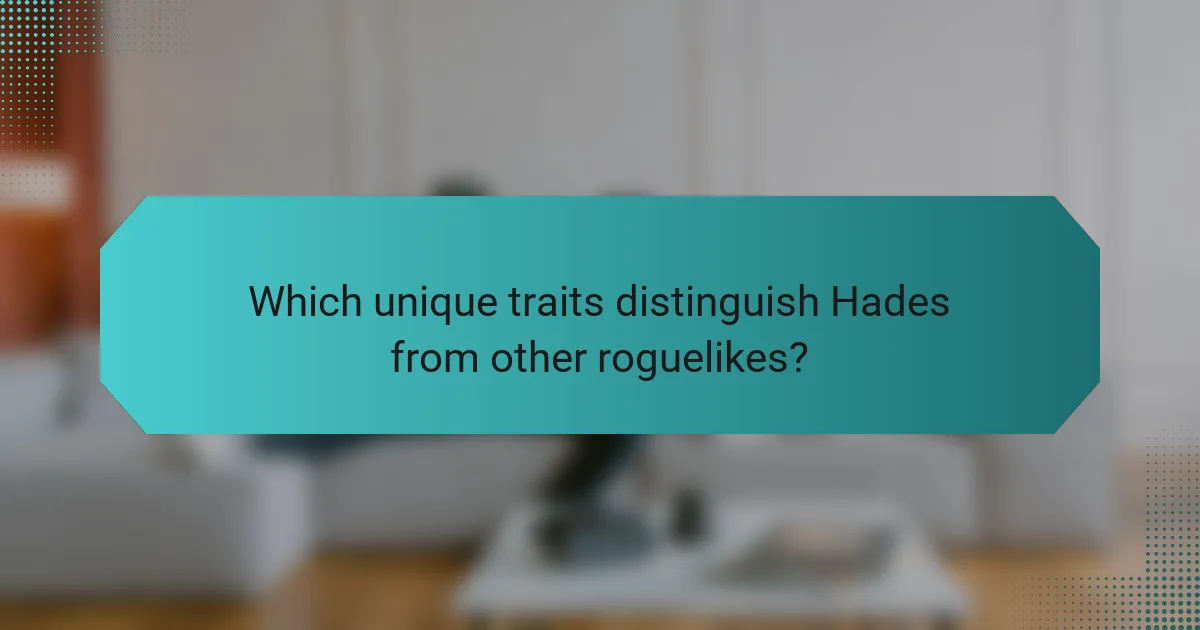
Which unique traits distinguish Hades from other roguelikes?
Hades stands out from other roguelikes due to its rich character development, engaging narrative, and unique procedural generation. These elements enhance replayability and create a deeply immersive experience. The game features a dynamic story that evolves with each run, allowing players to build relationships with characters. Additionally, Hades employs a distinct art style and music that contribute to its overall atmosphere, further differentiating it from typical roguelikes. The combination of these unique traits fosters a compelling gameplay loop that encourages exploration and experimentation.
What innovative features set Hades apart in the genre?
Hades stands out in its genre due to its innovative procedural generation, deep character development, and high replayability. The game dynamically alters environments and encounters, ensuring each run feels unique. Character arcs evolve based on player choices, enhancing emotional engagement. Additionally, Hades employs a robust progression system that encourages multiple playthroughs, allowing players to explore different strategies and build combinations. This blend of features creates a rich, immersive experience that keeps players returning for more.
How does the narrative structure influence player engagement?
The narrative structure significantly enhances player engagement in Hades by intertwining character development with procedural generation. This approach creates a dynamic storytelling experience that evolves with each playthrough. Players become invested in the characters as their backstories unfold through interactions, fostering emotional connections. The procedural generation aspect ensures that each run feels unique, maintaining a sense of novelty and excitement. As a result, players are encouraged to replay the game, exploring different narrative paths and character arcs, which reinforces engagement and immersion.
What are the most notable artistic attributes of Hades?
Hades features notable artistic attributes including striking visual design, dynamic character animations, and a rich narrative style. The game’s procedural generation enhances replayability by creating unique environments and encounters. Each character exhibits distinct personality traits, contributing to character development that deepens player engagement. The art direction combines vibrant colors with mythological themes, resulting in a visually captivating experience.
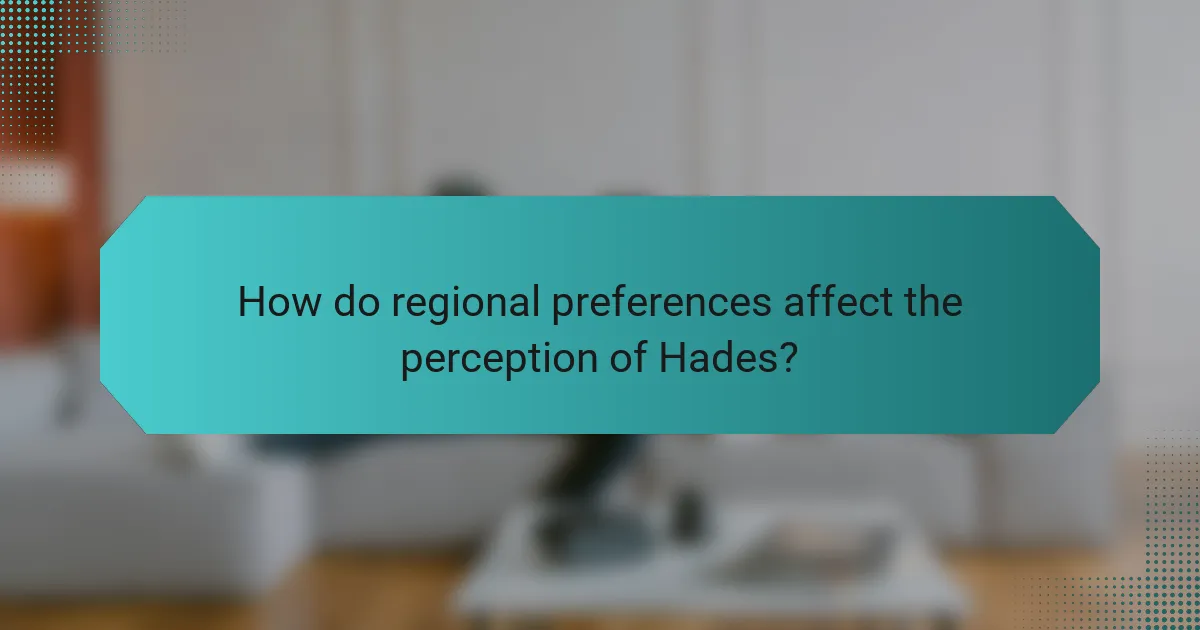
How do regional preferences affect the perception of Hades?
Regional preferences significantly influence the perception of Hades, shaping player engagement and enjoyment. Different cultures may emphasize various aspects, such as character development or procedural generation techniques, affecting overall gameplay experience. For instance, players from regions with a strong narrative focus may appreciate the character arcs more than those who prioritize gameplay mechanics. Additionally, local gaming trends can impact how replayability is valued, with some players seeking new challenges while others prefer familiar experiences. Understanding these regional nuances enhances the game’s appeal and fosters a deeper connection with diverse audiences.
What gameplay elements resonate with players in different regions?
Players in different regions resonate with Hades’ gameplay elements like procedural generation, character development, and replayability due to their unique cultural preferences. For example, procedural generation appeals to players seeking fresh experiences with each playthrough. Character development engages players through relatable narratives and diverse personalities, enhancing emotional connections. Replayability attracts players who enjoy mastering challenges and discovering new strategies. This combination of elements fosters a global appeal while allowing for regional variations in player engagement.
How do cultural references in Hades impact player experience?
Cultural references in Hades enhance player experience by deepening engagement and enriching narrative context. The game incorporates mythological figures and stories, creating a familiar yet unique atmosphere. This connection fosters emotional investment and encourages exploration of character backstories. Players discover layers of meaning through interactions, making each playthrough feel distinct. The interplay between procedural generation and these references contributes to high replayability, as players uncover new insights with each attempt.
What community feedback shapes the game’s ongoing development?
Community feedback significantly influences Hades’ development, enhancing gameplay and character interactions. Player suggestions have led to improvements in procedural generation, ensuring varied experiences. Feedback on character arcs has refined narratives, deepening emotional connections. Additionally, community input has shaped replayability features, promoting sustained engagement.
What best practices can enhance player experience in Hades?
To enhance player experience in Hades, focus on engaging storytelling, character interactions, and varied gameplay mechanics. These elements foster emotional connections and encourage exploration.
Incorporating procedural generation allows for unique environments and challenges each run. Character development through relationships and dialogue deepens player investment. Replayability is maximized by diverse builds, weapon choices, and evolving strategies, ensuring each session feels fresh.
Moreover, frequent updates and community engagement can keep the game dynamic, responding to player feedback. Balancing difficulty and providing rewarding progression systems further enhances satisfaction, making players eager to return.